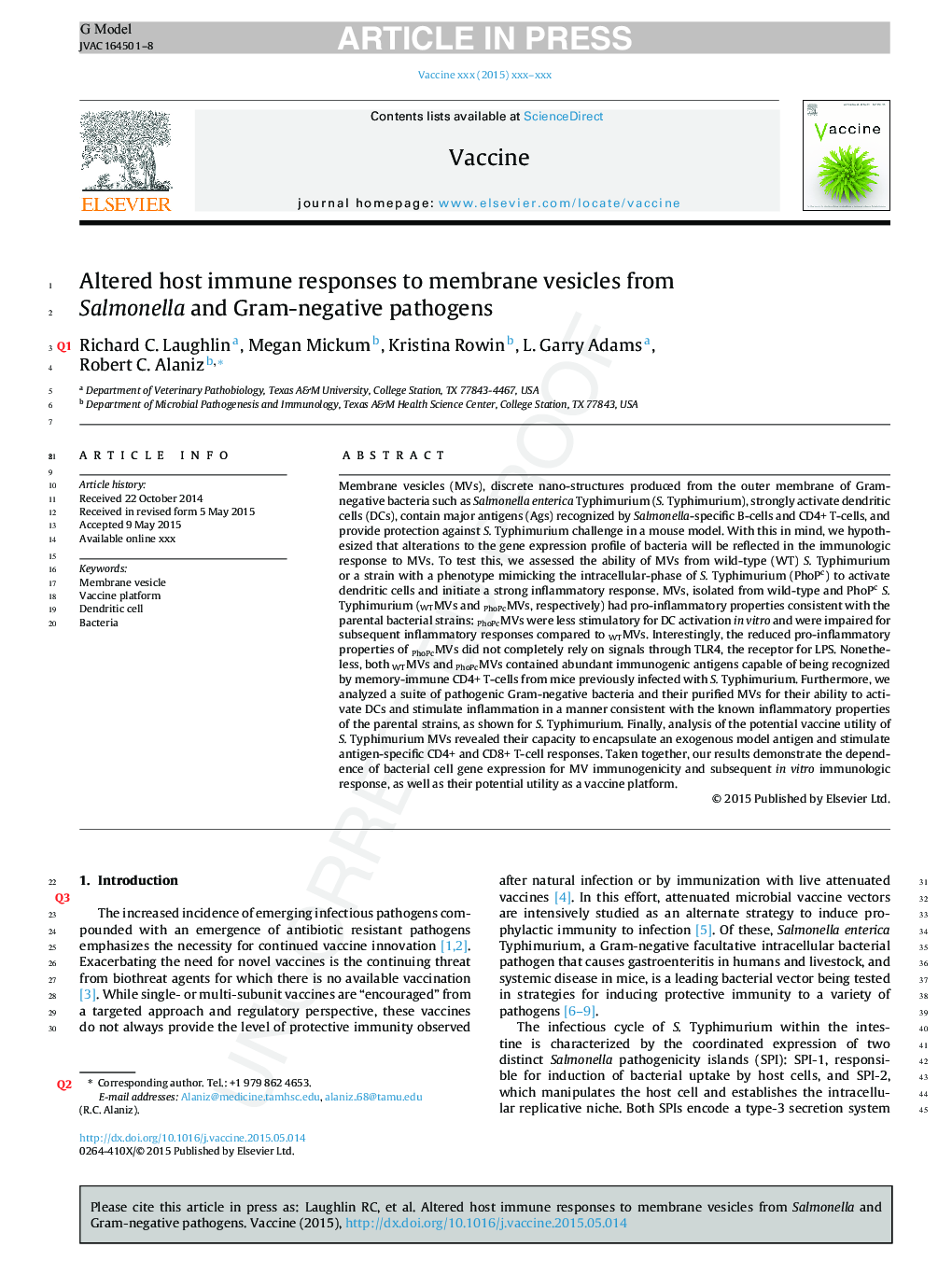| کد مقاله | کد نشریه | سال انتشار | مقاله انگلیسی | نسخه تمام متن |
|---|---|---|---|---|
| 10963583 | 1102686 | 2015 | 8 صفحه PDF | دانلود رایگان |
عنوان انگلیسی مقاله ISI
Altered host immune responses to membrane vesicles from Salmonella and Gram-negative pathogens
ترجمه فارسی عنوان
پاسخ های ایمنی میزبان تغییر یافته به غشاهای غشایی از سالمونلا و پاتوژن های گرم منفی
دانلود مقاله + سفارش ترجمه
دانلود مقاله ISI انگلیسی
رایگان برای ایرانیان
کلمات کلیدی
غشاء غشایی، واکسن پلت فرم، سلول دندریتیک، باکتری،
موضوعات مرتبط
علوم زیستی و بیوفناوری
ایمنی شناسی و میکروب شناسی
ایمونولوژی
چکیده انگلیسی
Membrane vesicles (MVs), discrete nano-structures produced from the outer membrane of Gram-negative bacteria such as Salmonella enterica Typhimurium (S. Typhimurium), strongly activate dendritic cells (DCs), contain major antigens (Ags) recognized by Salmonella-specific B-cells and CD4+ T-cells, and provide protection against S. Typhimurium challenge in a mouse model. With this in mind, we hypothesized that alterations to the gene expression profile of bacteria will be reflected in the immunologic response to MVs. To test this, we assessed the ability of MVs from wild-type (WT) S. Typhimurium or a strain with a phenotype mimicking the intracellular-phase of S. Typhimurium (PhoPc) to activate dendritic cells and initiate a strong inflammatory response. MVs, isolated from wild-type and PhoPcS. Typhimurium (WTMVs and PhoPcMVs, respectively) had pro-inflammatory properties consistent with the parental bacterial strains: PhoPcMVs were less stimulatory for DC activation in vitro and were impaired for subsequent inflammatory responses compared to WTMVs. Interestingly, the reduced pro-inflammatory properties of PhoPcMVs did not completely rely on signals through TLR4, the receptor for LPS. Nonetheless, both WTMVs and PhoPcMVs contained abundant immunogenic antigens capable of being recognized by memory-immune CD4+ T-cells from mice previously infected with S. Typhimurium. Furthermore, we analyzed a suite of pathogenic Gram-negative bacteria and their purified MVs for their ability to activate DCs and stimulate inflammation in a manner consistent with the known inflammatory properties of the parental strains, as shown for S. Typhimurium. Finally, analysis of the potential vaccine utility of S. Typhimurium MVs revealed their capacity to encapsulate an exogenous model antigen and stimulate antigen-specific CD4+ and CD8+ T-cell responses. Taken together, our results demonstrate the dependence of bacterial cell gene expression for MV immunogenicity and subsequent in vitro immunologic response, as well as their potential utility as a vaccine platform.
ناشر
Database: Elsevier - ScienceDirect (ساینس دایرکت)
Journal: Vaccine - Volume 33, Issue 38, 11 September 2015, Pages 5012-5019
Journal: Vaccine - Volume 33, Issue 38, 11 September 2015, Pages 5012-5019
نویسندگان
Richard C. Laughlin, Megan Mickum, Kristina Rowin, L. Garry Adams, Robert C. Alaniz,
